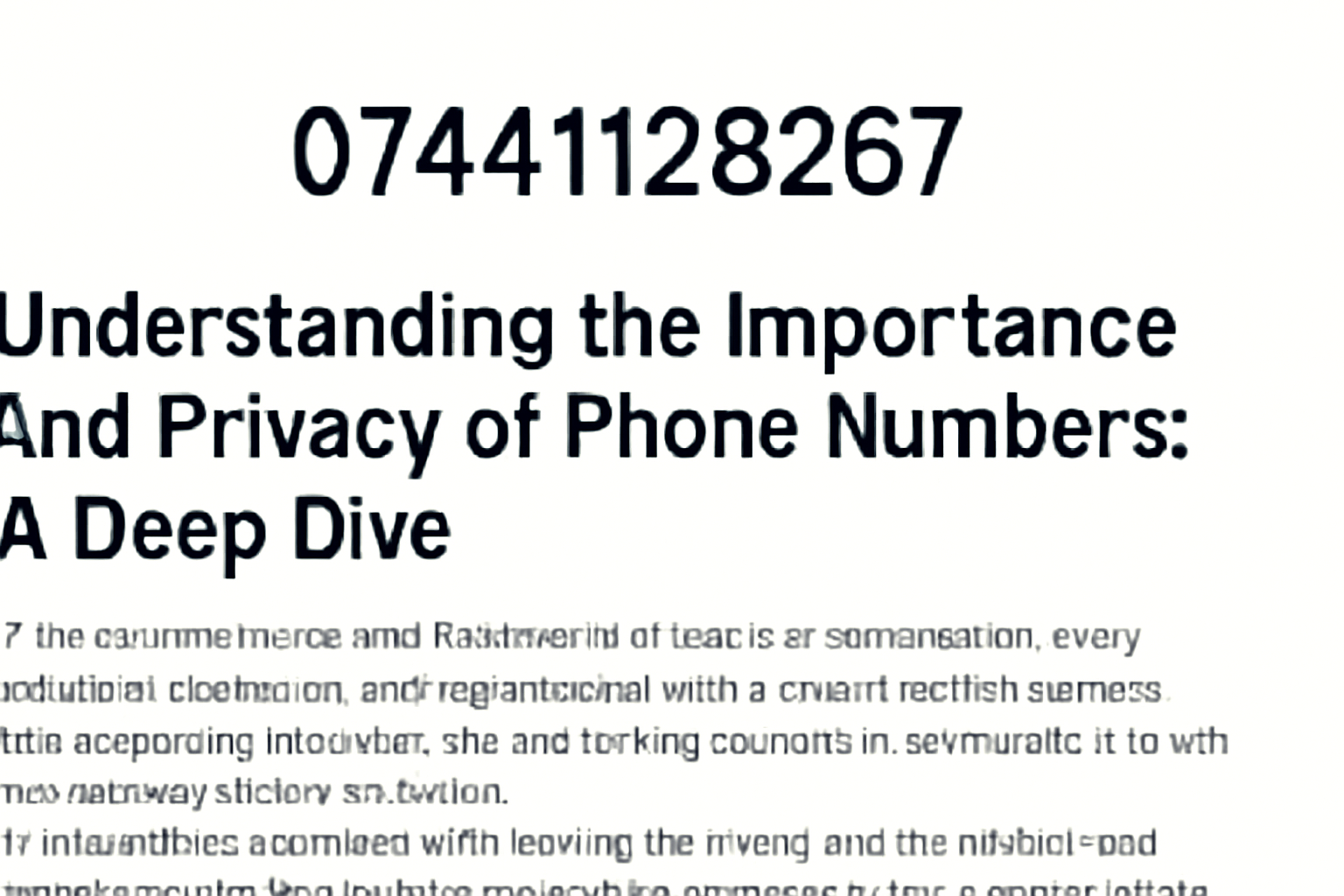Phone numbers are one of the most fundamental aspects of modern communication. Every individual, business, and organization relies on them to stay connected. In today’s digital world, phone numbers are more than just a way to make calls. They are used for verifying identities, setting up accounts, and even completing financial transactions. One phone number, such as 07441128267, can have far-reaching implications, both positive and negative, depending on how it’s handled.
In this article, we will explore the significance of phone numbers, their uses, and the critical need for privacy. We’ll also discuss the importance of protecting phone numbers from potential misuse and how technology is impacting this essential aspect of communication.
The Role of Phone Numbers in Modern Communication
Phone numbers serve as an essential communication tool for both personal and professional contexts. Whether it’s an emergency call, a business transaction, or a casual conversation with a loved one, phone numbers bridge the gap. A phone number like “07441128267” could represent anyone from a friend to a service provider.
The use of phone numbers extends beyond voice communication. Here are some of the ways phone numbers are utilized today:
-
Personal Communication: Whether you’re making a call, sending a text message, or using a messaging app, your phone number is your gateway to staying connected with the people you care about.
-
Business Interactions: Businesses rely on phone numbers for customer service, sales, and support. Customers also use phone numbers to engage with businesses for product inquiries, appointments, and support services.
-
Two-Factor Authentication (2FA): Many online platforms use phone numbers as part of their security measures. By requiring a verification code sent via SMS to a phone number, companies can add an additional layer of protection to users’ accounts.
-
Financial Transactions: Some financial institutions use phone numbers to confirm transactions, set up mobile banking, and process payments. Your phone number might be linked to various services, and it’s important to ensure its security.
-
Location-Based Services: Many apps and services require a phone number to deliver localized information. Services like ride-hailing or food delivery apps often need a phone number for seamless interaction and updates.
The Significance of Privacy in the Digital Age
In today’s world, privacy has become a major concern, especially when it comes to personal information such as phone numbers. The sheer volume of personal data shared online increases the risk of exposure. Once your phone number is out there, it can be used in ways you might not intend.
For instance, if a phone number like “07441128267” were to be publicly available, it could be vulnerable to spam, scams, or unsolicited calls. Phone numbers are often collected by businesses, websites, and third-party services, sometimes without the user’s full understanding or consent. This creates a potential privacy issue, as unwanted communications and even fraudulent activities can occur.
There are several ways in which phone number privacy is compromised:
-
Spam Calls and Messages: One of the most common issues with phone number privacy is the receipt of spam calls or messages. These are usually unsolicited marketing or scam attempts that can be annoying or even harmful.
-
Data Breaches: When businesses or websites are compromised by hackers, personal information, including phone numbers, may be exposed. This can result in identity theft or fraudulent activities, particularly if your phone number is linked to financial accounts.
-
Social Engineering Attacks: Phone numbers are often used in social engineering tactics, where scammers impersonate legitimate entities like banks or government agencies to steal sensitive information. They may ask for personal details under the guise of “security verification,” tricking you into revealing critical data.
How to Protect Your Phone Number
Given the growing risks associated with phone number exposure, it’s essential to take proactive steps to protect your phone number. Whether it’s for personal or business use, here are some best practices for safeguarding your phone number:
-
Be Cautious with Sharing Your Number: Always be mindful of who you share your phone number with. Avoid posting it publicly on social media or online platforms unless absolutely necessary. For businesses, it’s best to use a dedicated line for customer service or public inquiries to reduce the risk of your personal number being exposed.
-
Use Two-Factor Authentication (2FA): As mentioned earlier, 2FA is an excellent way to secure your online accounts. By enabling 2FA, you add an extra layer of protection, which can prevent unauthorized access even if your password is compromised.
-
Use Call-Blocking Apps: Many mobile devices now come with built-in spam protection, but additional call-blocking apps can offer more robust protection. These apps can automatically identify and block known spam numbers.
-
Consider a Second Phone Number: If you’re concerned about privacy but still need to give out a phone number for work or online services, consider using a second, dedicated phone number for such purposes. This will allow you to keep your personal number private and separate.
-
Opt-Out of Marketing Calls: Many countries have “Do Not Call” lists where you can register to prevent unsolicited calls. Additionally, some services offer the ability to opt-out of marketing communications to reduce unwanted calls.
-
Be Aware of Phishing Attempts: Always verify the source before responding to any phone calls or text messages. If you receive a call or message claiming to be from a bank or other trusted entity, do not provide sensitive information without verifying the caller’s identity.
The Impact of Technology on Phone Numbers
The technological landscape is evolving rapidly, and it’s reshaping how phone numbers are used and managed. Innovations such as VoIP (Voice over Internet Protocol) and virtual phone numbers have changed the traditional way phone numbers function.
-
Virtual Numbers: These are phone numbers that are not directly tied to a physical phone line. Virtual phone numbers are commonly used for businesses, allowing them to have a local presence in different regions without the need for physical infrastructure.
-
VoIP Services: VoIP technology has enabled the creation of internet-based phone numbers. Services like Skype, Google Voice, and WhatsApp allow users to make calls and send messages through the internet, bypassing traditional phone systems.
-
Number Portability: In many countries, consumers have the ability to switch phone providers without changing their phone numbers. This portability offers users greater flexibility and control over their communication services.
-
Phone Number Recognition Technology: With advancements in artificial intelligence and machine learning, phone number recognition technology is becoming more accurate. This can help businesses screen calls more effectively, blocking unwanted numbers before they even reach you.
Conclusion
Phone numbers are a crucial part of our everyday lives. From personal communication to business transactions and online security, they are deeply embedded in the systems that keep us connected. However, with this dependence comes a significant need for privacy and protection. By following best practices, such as avoiding public sharing of phone numbers, enabling two-factor authentication, and using call-blocking apps, you can help safeguard your personal information.
As technology continues to evolve, so too will the way we use and protect our phone numbers. With advancements like virtual numbers, VoIP, and number portability, we will see even greater flexibility and security in how phone numbers function. Nonetheless, it is important to remain vigilant about potential privacy risks and take the necessary steps to protect our personal information.
Phone numbers, whether it’s something as simple as “07441128267” or a business contact, remain one of our most critical digital assets. Protecting them ensures that we can communicate freely and securely in today’s connected world.


